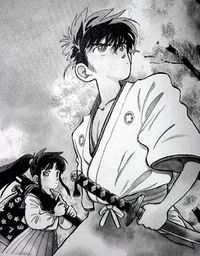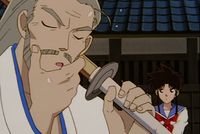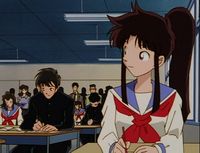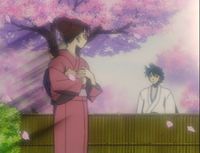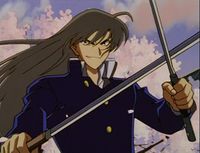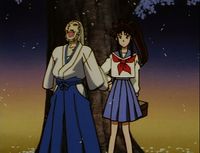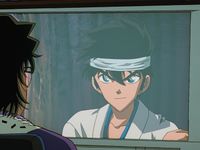Difference between revisions of "Play It Again"
(→Cast) |
|||
| (28 intermediate revisions by 10 users not shown) | |||
| Line 1: | Line 1: | ||
| − | + | [[File:PlayItAgainlogo.png|right|200px|Logo of "Play It Again"]] | |
| − | | | + | [[File:Play_It_Again_Chapter_Cover.jpg|thumb|right|200px|Cover artwork for ''Play It Again''.]] |
| − | | | + | {{nihongo|'''Play It Again'''|プレイ・イット・アゲイン|Purei Itto Agein}} (literally "Play it again") is a short story by [[Gosho Aoyama]] which was published in May 1988. It revolves around the old kendo master [[Sanjuro Tsurugi]] who is rejuvenated by the blossoms of a magical cherry tree and experiences parts of his youth from a new perspective in the form of the high school student [[Sanjuro Sakura]]. The story was the prototype for Gosho's series ''[[Yaiba]]''<ref>''Aoyama Gōshō 30-Shūnen Hon'', comment in the section on "Play It Again" in the chapter "Read it again!"</ref> and prominently features the topic of rejuvination, which he also used for ''[[Magic Kaito]]'' and ''[[Detective Conan]]''. |
| − | | | + | |
| − | | | + | The story can be found as the fourth chapter in ''[[Gosho Aoyama's Collection of Short Stories]]'' from 1994 and the renewal edition from 2011. Furthermore, an adaptation was made in 1999 as an original video animation, numbered as the sixth episode of the anime version of ''Gosho Aoyama's Collection of Short Stories''. |
| − | | | + | |
| − | + | == Characters == | |
| − | + | {{main|Characters}} | |
| − | + | ||
| − | + | === Introduced === | |
| − | + | In order of introduction: | |
| − | + | ||
| − | + | {{BeginTable Char|no-english=1}} | |
| − | + | {{CharItem|no-english=1|Michiko Tsurugi|Sanjuro's granddaughter and kendo student. Currently attends the second year of high school in class 2-D.}} | |
| − | + | {{CharItem|no-english=1|Sanjuro Tsurugi|Kendo master, Michiko's grandfather and teacher. Gets rejuvenated by the blossoms of a magical cherry tree.}} | |
| − | | | + | {{CharItem|no-english=1|Sanjuro Sakura|Sanjuro Tsurugi's rejuvenated form, biologically around his granddaughter's age (16-17).}} |
| − | }} | + | {{CharItem|no-english=1|Sonoko Suzuki|Youngest daughter of the [[Suzuki family]], cameo from ''Detective Conan''. Appears in the anime only.}} |
| − | = | + | {{CharItem|no-english=1|Ran Mouri|Daughter of private detective [[Kogoro Mouri]], cameo from ''Detective Conan''. Appears in the anime only.}} |
| − | == | + | {{CharItem|no-english=1|Harue|Sanjuro's childhood love from over 60 years ago. Lives in [[Beika]] and appears in the anime only.}} |
| − | {{ | + | {{CharItem|no-english=1|Tatsuya Nakadai|Student who attends Michiko's high school. Skilled kendo fighter from the local club, wants to harass Michiko.}} |
| − | {{ | + | {{EndTable}} |
| − | + | ||
| − | + | == Settings == | |
| − | + | {{main|Setting}} | |
| − | {{ | + | |
| − | + | === Introduced === | |
| − | {{ | + | In order of introduction: |
| − | + | ||
| − | + | * [[Tokyo]] | |
| − | {{ | + | ** Unknown ward |
| − | + | *** [[Tsurugi residence]] | |
| − | + | *** [[Unnamed high school (Play It Again)|Unnamed high school]] | |
| − | {{ | + | ** [[Beika Ward]] (Anime only) |
| + | *** [[Beika Station]] (Anime only) | ||
| + | *** [[Beika Shrine]] (Anime only) | ||
| + | *** [[Harue's residence]] (Anime only) | ||
== Plot == | == Plot == | ||
| + | [[File:Play_It_Again_Sanjuro_and_Michiko.jpg|thumb|200px|right|Sanjuro doesn't understand his granddaughter's behavior.]] | ||
| + | An old kendo master named [[Sanjuro Tsurugi]] gets a visit by his granddaughter, who's also his student, 17-year-old [[Michiko Tsurugi]]. He would like to come to parents' day at school to watch how she's doing in class, but she is against the idea since she considers him insufferable and because he always carries his kendo sword around with him. Sanjuro then reprimands her for this behavior and informs her about the old cherry tree that stands in this garden and was planted when he was born and still proudly bears its blossoms today. She should take an example from it, being as strong as the flowers and the trees. Michiko reacts to this wisdom in an angered manner, which the master uses as an invitation to fight with her. While he is still mocking her because no one has ever "hit Sanjuro the demon", she suddenly runs off. He follows her, always in a circle around the cherry tree, until he can't breathe anymore. Just as he sinks to his knees exhausted and realizes that even a grandmaster has no hold over his own old age, Michiko approaches from behind and hits him with a kendo stick. Sanjuro cannot cope with the fact that he was defeated by a girl who makes fun of him since he is "80 years old already". | ||
| + | |||
| + | [[File:Play_It_Again_Michiko_in_Class.jpg|thumb|200px|left|Michiko is glad that her grandfather did not follow her.]] | ||
| + | Michiko departs for school, while Sanjuro wearily lies down in the shade of the cherry tree and begins a monologue with it about how much he envies it that it's still full of strength and beauty, despite being just as old as him - and that he wishes to be young again. Sanjuro falls asleep, still lying under the tree, and is covered by its cherry blossoms. | ||
| + | |||
| + | At the same time at Michiko's high school, class has started. She watches the parents standing in the back of the classroom and is relieved to find out her grandfather is not present. Meanwhile, he wakes up under a mountain of cherry blossoms - now just as old as his granddaughter. He runs off to the school and bursts into her classroom, where he openly challenges her to a revanche battle, but nobody recognizes him, not even Michiko. Sanjuro thinks that she wants to make fun of him again at first until the teacher grabs him by the collar, gives him a lecture about causing a disruption in the middle of the lesson, and tells him to put on appropriate clothes and return to his own class. Sanjuro does not understand what is wrong with his kendo outfit and looks at himself in a mirror inside the stairwell of the school, where he realizes that he is indeed young again. He immediately puts his new youth to the test by running around the schoolyard incessantly, taking pleasure in not getting tired at all. He is observed by Michiko and her friend, and it occurs to the former that the apparently strange boy's kimono looks like that of her grandfather. | ||
| + | |||
| + | Sanjuro begins a trip through [[Tokyo]] and does everything he ever wanted to do: play baseball and bowling, as well as eating a full meal at McDonald's. | ||
| + | |||
| + | [[File:Play_It_Again_Sanjuros_Memory.jpg|thumb|200px|right|Sanjuro remembers the girl from over 60 years ago.]] | ||
| + | In a subplot only present in the [[Play It Again (Anime)|anime]], he then takes a ride to [[Beika]] and enters a magazine store at [[Beika Station]], where he is about to browse through the porn magazines, which he refrains from when [[Ran Mouri]] and [[Sonoko Suzuki]] walk past him. Looking at the books, feigning innocence, he sees the book "Touson" by [[Wikipedia:Mokichi Saitō|Mokichi Saito]], which he hasn't read for ages. He opens a few pages and sees a poem about a girl with a flower comb in her hair, which reminds him of something. He takes the train to another part of this city, but at first he can hardly find his way around since the last time he was here was over 60 years ago. With the help of a signpost, he finds the way to the [[Beika Shrine]], where no one's present. There's also no one at the back of the shrine, at the old well, but Sanjuro now remembers that she lived somewhere nearby. | ||
| + | |||
| + | Strolling around aimlessly he gets lost again, whereupon cherry blossoms fly towards him from the entrance of a property. He takes a look at the garden of the house and has another déjà vu. He finally notices the girl from back then, [[Harue]], six decades older, with a grown-up daughter and a small granddaughter. Sanjuro recognizes her by her golden flower comb in her hair and sheds a tear, but leaves the scene again immediately after, though the old lady seems to have recognized Sanjuro for a moment. | ||
| + | |||
| + | In a scene merging this side story with the manga's plot again, he returns to the school, wondering what to do next. But first of all he wants to go to the bathroom where he overhears the conversation of three male students, led by the long-haired [[Tatsuya Nakadai]], who are planning to assault Michiko and also talk about their grandfather, whom they rule out as a threat because he is "just a geezer". Sanjuro tells them to leave Michiko alone, easily defeating Nakadai's henchmen. Nakadai, who is also part of the kendo club, therefore takes on the matter himself and challenges Sanjuro to a fight. | ||
| + | |||
| + | When everyone has gathered in the schoolyard to watch the fight and the two face each other, Michiko cheers on Nakadai of all people, since she's oblivious about his nefarious plans for her. Sanjuro reacts so confused about Michiko's cheering that Nakadai can land a heavy blow on him. He finds himself in the infirmary, where Michiko puts a forehead bandage on him and explains that it would be wise not to mess with Nakadai, especially since she already has "a stubborn samurai" at home who doesn't know when to stop - and that she only treats him because of that exact reason. He then tells her that one day she would become a good wife for someone, with her wanting to know his name. He introduces himself as "Sanjuro Sakura" ("sakura" = "cherry blossom"), a name she just considers strange. | ||
| + | |||
| + | [[File:Play_It_Again_Tatsuya_Nakadai.jpg|thumb|200px|left|Nakadai fights by unfair means.]] | ||
| + | Sanjuro follows Michiko home because he has nowhere else to go, but she makes it clear to him that he shouldn't harm her, because otherwise her grandfather would destroy him. She then happily realizes that Nakadai is already waiting at the entrance to the house, challenging Sanjuro to a new fight, because the previous one in the schoolyard did not convince him. This gets Sanjuro in a dilemma, though: If he beats Nakadai, Michiko will feel sorry for him and hate Sanjuro, but should he lose, the honorless Nakadai would actually have won her heart. Nakadai suddenly draws a real sword out of his wooden stick, pushes Michiko aside, who wants to keep him from using it, and tries to attack Sanjuro with it. After several swings, he hurts him at his left shoulder. Meanwhile, Michiko is in tears, looking for her grandfather, because otherwise "Sakura" might die. | ||
| + | |||
| + | Just as "Sanjuro Sakura" finds himself in a hopeless spot by Nakadai's action of throwing knives and threatening to finish him off, Michiko discovers her grandfather's katana and throws it in Sanjuro's direction. He can now use his own technique "Hikken - Cherry Blossom Storm" while both opponents rush past each other. Nakadai's school uniform is suddenly shred to pieces and when he sinks to his knees, realizing that he has lost, it becomes apparent that Sanjuro also cut off his hair. While Nakadai mournfully leaves the property, Michiko is overjoyed that Sanjuro is fine and returns to the house to get a first aid kit for his shoulder. Sanjuro starts another monologue with the cherry tree and explains that he recognized that it was the tree who gave him a second chance at being young, but that it's enough, because he now has everything he wanted to have. He then reminisces about the entire day and the experiences he made. | ||
| + | |||
| + | [[File:Play_It_Again_Closing_Moment.jpg|thumb|200px|right|Sanjuro is amused by what his granddaughter says.]] | ||
| + | Michiko returns with the kit, with "Sakura" gone and her grandfather back in his place. She asks the old man where he was, with him replying that he only took a short walk. When she asks him about Sanjuro Sakura, her grandfather counters her question by asking whether she actually fell in love with such a good-for-nothing, to which she responds by saying that he was "much cooler than him". Sanjuro can only laugh about the irony, concluding the story. | ||
| + | |||
| + | == Anime == | ||
| + | {{main|Play It Again (Anime)}} | ||
| + | On December 22nd, 1999, an original video animation was released based on ''Play It Again'', being the sixth episode of ''[[Gosho Aoyama's Collection of Short Stories]]'', which was available on VHS Volume 2. (There's only one volume of the DVD/Blu-Ray.) It is an adaptation very close to the content of the original manga chapter, but expanded to include an original subplot in the middle in which [[Sanjuro Sakura]] takes a train ride to [[Beika]] to meet his childhood sweetheart, the old lady [[Harue]], whom he recognizes by the golden comb in her hair, which is also a cross-reference to the OVA of ''[[Detective George's Mini-Mini Big Strategy]]'', where the small detective returns the comb to her. Sanjuro also finds some traces of [[George Krishima]]'s and [[Asami Ashikawa]]'s emergency at the well of [[Beika Shrine]]. After finding Harue, he returns to his granddaughter's high school, where the anime seamlessly merges with the plot of the manga again. | ||
| + | |||
| + | == ''Play It Again'' in ''Detective Conan'' == | ||
| + | [[File:Episode_269_Sanjuro_Sakura.jpg|thumb|right|200px|Sanjuro in episode 269 of ''Detective Conan''.]]{{main|Crossover#Play It Again in Detective Conan}} | ||
| + | The victim of the "Missing Watch Case" (Manga: [[Volume 33#Missing Watch Case|335-337]], Anime: [[The Forgotten Memento from the Crime|269-270]]), [[Eiko Idetsuki]], enjoys watching her favorite movie at high volume, which is called ''[[Sanjuro Sakura]]'', but is ''Play It Again'' in everything but name. Additionally to having the name of this short story's protagonist as its title, several dialogues directly from the manga/OVA can be read/heard during the case. The scene briefly visible on the TV seems to take place shortly before the end of the story, while Sanjuro fights [[Tatsuya Nakadai]] a second time, as he is already wearing the bandage he got from their first encounter after getting treated by [[Michiko Tsurugi]], as well as the trees of the [[Tsurugi residence]] being visible in the background. | ||
| + | |||
| + | In the second episode of the OVA series ''[[Gosho Aoyama's Collection of Short Stories]]'', which is a tie-in to the ''[[Detective Conan]]'' franchise, [[Yusaku Kudo]] places the original 1994 version of the short story manga volume on the place next to him after entering the cinema. In the subsequent close-up, one can spot Sanjuro Sakura on the book's cover, along with other main characters of [[Gosho Aoyama]]'s short stories. | ||
| − | == | + | == Trivia == |
| + | * Sanjuro's name in both of his identities is taken from the [[Wikipedia:Akira Kurosawa|Akira Kurosawa]] films ''[[Wikipedia:Yojimbo|Yojimbo]]'' (1961) and ''[[Wikipedia:Sanjuro|Sanjuro]]'' (1962), the latter being one of [[Gosho Aoyama]]'s most favorite movies, and its eponymous samurai protagonist, Sanjuro Tsubaki, played by [[Wikipedia:Toshiro Mifune|Toshiro Mifune]]. "Tsubaki" was changed to "[[Wikipedia:Tsurugi (sword)|Tsurugi]]", a type of japanese sword. | ||
| + | * As in many other works by [[Gosho Aoyama]], the theme of rejuvenation is found in this story. The original Japanese title "Play It Again" is based on a misattributed quote<ref>[https://www.theguardian.com/film/2009/may/11/star-wars-movie-misquotes-poll Darth Vader line is the daddy of film misquotes, finds poll] In: ''The Guardian''. May 11th, 2009</ref> about the film ''[[Wikipedia:Casablanca (film)|Casablanca]]'' from 1942 and, in the context of this story, refers to the rejuvenation of [[Sanjuro Tsurugi]], who relives some parts of his youth under the name of "[[Sanjuro Sakura]]", similar to how [[Shinichi Kudo]] renamed himself [[Conan Edogawa]] after his own rejuvenation. | ||
| + | * This short story served as a prototype to Aoyama's subsequent weekly series and first real success, ''[[Yaiba]]''. A lot of elements from it are already present in here: | ||
| + | ** Both use titles usually written in latin letters or katakana. | ||
| + | ** [[Sanjuro Sakura]] resembles a slightly older and less pointy-haired version of [[Yaiba Kurogane]] with sideburns and his father, [[Kenjuro Kurogane]], while [[Michiko Tsurugi]] has strong similarities to a high school-aged [[Sayaka Mine]]. | ||
| + | ** Michiko's name has also been reused for Yaiba's and [[Moroha Kurogane|Moroha]]'s mother, [[Michiko Kurogane]]. The latter's maiden name is Michiko Tsubaki, with the "Tsubaki" derived from Sanjuro Tsubaki of ''Yojimbo'' and ''Sanjuro'' fame, who was also the namesake for the protagonist of this short story. | ||
| + | ** [[Tatsuya Nakadai]] is a prototype to [[Takeshi Onimaru]], with the former being less honorable from the get-go, while the latter becomes evil by virtue of demonic possession. There's a scene in ''Yaiba'' similar to the moment Nakadai draws a real sword and hurts Sanjuro briefly after Onimaru gets possessed. Additionally, Nakadai gets his hair cleanly shaven off in the battle against Sanjuro, while Onimaru is bald. | ||
| + | ** The scene in the school infirmary, where Michiko treats Sanjuro's wounds after trying to battle Nakadai for the first time, happens similarly in ''Yaiba'', where Sayaka treats Yaiba's wounds after he tried to challenge Onimaru. | ||
| + | ** The [[Tsurugi residence]] is a traditional samurai house very similar to the [[Mine residence]]. | ||
| + | * Several things hint at Michiko's school being [[Ekoda High School|Ekoda High]] in its incarnation from ''[[Magic Kaito]]'', like both buildings looking very similar, the identical design of the winter uniform and a girl looking exactly like [[Keiko Momoi]] being present on the schoolyard during Sanjuro's and Nakadai's first battle. However, it's never confirmed whether it is the same school or just a case of design recycling. | ||
| + | * Michiko's class teacher, on the other hand, looks like the [[Bushi TV]] reporter present in the first three volumes of ''Magic Kaito'', who often reports about [[Kaitou Kid]]'s heists. | ||
| + | * There are several students in the anime version of Michiko's class who look like [[Aoko Nakamori]], [[Shiho Miyano]] and Keiko Momoi, among others. | ||
| + | * Sanjuro Tsurugi's childhood sweetheart [[Harue]] is the client of private detective [[George Kirishima]] from ''[[Detective George's Mini-Mini Big Strategy]]''. She's also living in [[Beika]], the fictional ward from ''[[Detective Conan]]''. Sanjuro recognizes her by the golden comb in her hair that George and [[Asami Ashikawa]] brought back. He also spots the locked well at the [[Beika Shrine]] with the torn rope from George's almost fatal dive. All of those connections are only present in the anime versions of these stories, though. | ||
| − | == | + | == References == |
| − | < | + | <references /> |
| − | |||
| − | |||
| − | + | {{Short Stories}} | |
| + | {{Yaiba}} | ||
| − | + | [[Category:Gosho Aoyama's Collection of Short Stories]] | |
| − | + | [[de:Noch einmal jung]] | |
| − | [[ | ||
Latest revision as of 18:13, 2 December 2023
Play It Again (プレイ・イット・アゲイン Purei Itto Agein) (literally "Play it again") is a short story by Gosho Aoyama which was published in May 1988. It revolves around the old kendo master Sanjuro Tsurugi who is rejuvenated by the blossoms of a magical cherry tree and experiences parts of his youth from a new perspective in the form of the high school student Sanjuro Sakura. The story was the prototype for Gosho's series Yaiba[1] and prominently features the topic of rejuvination, which he also used for Magic Kaito and Detective Conan.
The story can be found as the fourth chapter in Gosho Aoyama's Collection of Short Stories from 1994 and the renewal edition from 2011. Furthermore, an adaptation was made in 1999 as an original video animation, numbered as the sixth episode of the anime version of Gosho Aoyama's Collection of Short Stories.
Contents
Characters
Introduced
In order of introduction:
| Picture | Name | Role |
|---|---|---|
 |
Michiko Tsurugi | Sanjuro's granddaughter and kendo student. Currently attends the second year of high school in class 2-D. |
 |
Sanjuro Tsurugi | Kendo master, Michiko's grandfather and teacher. Gets rejuvenated by the blossoms of a magical cherry tree. |
 |
Sanjuro Sakura | Sanjuro Tsurugi's rejuvenated form, biologically around his granddaughter's age (16-17). |
 |
Sonoko Suzuki | Youngest daughter of the Suzuki family, cameo from Detective Conan. Appears in the anime only. |
 |
Ran Mouri | Daughter of private detective Kogoro Mouri, cameo from Detective Conan. Appears in the anime only. |
 |
Harue | Sanjuro's childhood love from over 60 years ago. Lives in Beika and appears in the anime only. |
 |
Tatsuya Nakadai | Student who attends Michiko's high school. Skilled kendo fighter from the local club, wants to harass Michiko. |
Settings
Introduced
In order of introduction:
- Tokyo
- Unknown ward
- Beika Ward (Anime only)
- Beika Station (Anime only)
- Beika Shrine (Anime only)
- Harue's residence (Anime only)
Plot
An old kendo master named Sanjuro Tsurugi gets a visit by his granddaughter, who's also his student, 17-year-old Michiko Tsurugi. He would like to come to parents' day at school to watch how she's doing in class, but she is against the idea since she considers him insufferable and because he always carries his kendo sword around with him. Sanjuro then reprimands her for this behavior and informs her about the old cherry tree that stands in this garden and was planted when he was born and still proudly bears its blossoms today. She should take an example from it, being as strong as the flowers and the trees. Michiko reacts to this wisdom in an angered manner, which the master uses as an invitation to fight with her. While he is still mocking her because no one has ever "hit Sanjuro the demon", she suddenly runs off. He follows her, always in a circle around the cherry tree, until he can't breathe anymore. Just as he sinks to his knees exhausted and realizes that even a grandmaster has no hold over his own old age, Michiko approaches from behind and hits him with a kendo stick. Sanjuro cannot cope with the fact that he was defeated by a girl who makes fun of him since he is "80 years old already".
Michiko departs for school, while Sanjuro wearily lies down in the shade of the cherry tree and begins a monologue with it about how much he envies it that it's still full of strength and beauty, despite being just as old as him - and that he wishes to be young again. Sanjuro falls asleep, still lying under the tree, and is covered by its cherry blossoms.
At the same time at Michiko's high school, class has started. She watches the parents standing in the back of the classroom and is relieved to find out her grandfather is not present. Meanwhile, he wakes up under a mountain of cherry blossoms - now just as old as his granddaughter. He runs off to the school and bursts into her classroom, where he openly challenges her to a revanche battle, but nobody recognizes him, not even Michiko. Sanjuro thinks that she wants to make fun of him again at first until the teacher grabs him by the collar, gives him a lecture about causing a disruption in the middle of the lesson, and tells him to put on appropriate clothes and return to his own class. Sanjuro does not understand what is wrong with his kendo outfit and looks at himself in a mirror inside the stairwell of the school, where he realizes that he is indeed young again. He immediately puts his new youth to the test by running around the schoolyard incessantly, taking pleasure in not getting tired at all. He is observed by Michiko and her friend, and it occurs to the former that the apparently strange boy's kimono looks like that of her grandfather.
Sanjuro begins a trip through Tokyo and does everything he ever wanted to do: play baseball and bowling, as well as eating a full meal at McDonald's.
In a subplot only present in the anime, he then takes a ride to Beika and enters a magazine store at Beika Station, where he is about to browse through the porn magazines, which he refrains from when Ran Mouri and Sonoko Suzuki walk past him. Looking at the books, feigning innocence, he sees the book "Touson" by Mokichi Saito, which he hasn't read for ages. He opens a few pages and sees a poem about a girl with a flower comb in her hair, which reminds him of something. He takes the train to another part of this city, but at first he can hardly find his way around since the last time he was here was over 60 years ago. With the help of a signpost, he finds the way to the Beika Shrine, where no one's present. There's also no one at the back of the shrine, at the old well, but Sanjuro now remembers that she lived somewhere nearby.
Strolling around aimlessly he gets lost again, whereupon cherry blossoms fly towards him from the entrance of a property. He takes a look at the garden of the house and has another déjà vu. He finally notices the girl from back then, Harue, six decades older, with a grown-up daughter and a small granddaughter. Sanjuro recognizes her by her golden flower comb in her hair and sheds a tear, but leaves the scene again immediately after, though the old lady seems to have recognized Sanjuro for a moment.
In a scene merging this side story with the manga's plot again, he returns to the school, wondering what to do next. But first of all he wants to go to the bathroom where he overhears the conversation of three male students, led by the long-haired Tatsuya Nakadai, who are planning to assault Michiko and also talk about their grandfather, whom they rule out as a threat because he is "just a geezer". Sanjuro tells them to leave Michiko alone, easily defeating Nakadai's henchmen. Nakadai, who is also part of the kendo club, therefore takes on the matter himself and challenges Sanjuro to a fight.
When everyone has gathered in the schoolyard to watch the fight and the two face each other, Michiko cheers on Nakadai of all people, since she's oblivious about his nefarious plans for her. Sanjuro reacts so confused about Michiko's cheering that Nakadai can land a heavy blow on him. He finds himself in the infirmary, where Michiko puts a forehead bandage on him and explains that it would be wise not to mess with Nakadai, especially since she already has "a stubborn samurai" at home who doesn't know when to stop - and that she only treats him because of that exact reason. He then tells her that one day she would become a good wife for someone, with her wanting to know his name. He introduces himself as "Sanjuro Sakura" ("sakura" = "cherry blossom"), a name she just considers strange.
Sanjuro follows Michiko home because he has nowhere else to go, but she makes it clear to him that he shouldn't harm her, because otherwise her grandfather would destroy him. She then happily realizes that Nakadai is already waiting at the entrance to the house, challenging Sanjuro to a new fight, because the previous one in the schoolyard did not convince him. This gets Sanjuro in a dilemma, though: If he beats Nakadai, Michiko will feel sorry for him and hate Sanjuro, but should he lose, the honorless Nakadai would actually have won her heart. Nakadai suddenly draws a real sword out of his wooden stick, pushes Michiko aside, who wants to keep him from using it, and tries to attack Sanjuro with it. After several swings, he hurts him at his left shoulder. Meanwhile, Michiko is in tears, looking for her grandfather, because otherwise "Sakura" might die.
Just as "Sanjuro Sakura" finds himself in a hopeless spot by Nakadai's action of throwing knives and threatening to finish him off, Michiko discovers her grandfather's katana and throws it in Sanjuro's direction. He can now use his own technique "Hikken - Cherry Blossom Storm" while both opponents rush past each other. Nakadai's school uniform is suddenly shred to pieces and when he sinks to his knees, realizing that he has lost, it becomes apparent that Sanjuro also cut off his hair. While Nakadai mournfully leaves the property, Michiko is overjoyed that Sanjuro is fine and returns to the house to get a first aid kit for his shoulder. Sanjuro starts another monologue with the cherry tree and explains that he recognized that it was the tree who gave him a second chance at being young, but that it's enough, because he now has everything he wanted to have. He then reminisces about the entire day and the experiences he made.
Michiko returns with the kit, with "Sakura" gone and her grandfather back in his place. She asks the old man where he was, with him replying that he only took a short walk. When she asks him about Sanjuro Sakura, her grandfather counters her question by asking whether she actually fell in love with such a good-for-nothing, to which she responds by saying that he was "much cooler than him". Sanjuro can only laugh about the irony, concluding the story.
Anime
On December 22nd, 1999, an original video animation was released based on Play It Again, being the sixth episode of Gosho Aoyama's Collection of Short Stories, which was available on VHS Volume 2. (There's only one volume of the DVD/Blu-Ray.) It is an adaptation very close to the content of the original manga chapter, but expanded to include an original subplot in the middle in which Sanjuro Sakura takes a train ride to Beika to meet his childhood sweetheart, the old lady Harue, whom he recognizes by the golden comb in her hair, which is also a cross-reference to the OVA of Detective George's Mini-Mini Big Strategy, where the small detective returns the comb to her. Sanjuro also finds some traces of George Krishima's and Asami Ashikawa's emergency at the well of Beika Shrine. After finding Harue, he returns to his granddaughter's high school, where the anime seamlessly merges with the plot of the manga again.
Play It Again in Detective Conan
The victim of the "Missing Watch Case" (Manga: 335-337, Anime: 269-270), Eiko Idetsuki, enjoys watching her favorite movie at high volume, which is called Sanjuro Sakura, but is Play It Again in everything but name. Additionally to having the name of this short story's protagonist as its title, several dialogues directly from the manga/OVA can be read/heard during the case. The scene briefly visible on the TV seems to take place shortly before the end of the story, while Sanjuro fights Tatsuya Nakadai a second time, as he is already wearing the bandage he got from their first encounter after getting treated by Michiko Tsurugi, as well as the trees of the Tsurugi residence being visible in the background.
In the second episode of the OVA series Gosho Aoyama's Collection of Short Stories, which is a tie-in to the Detective Conan franchise, Yusaku Kudo places the original 1994 version of the short story manga volume on the place next to him after entering the cinema. In the subsequent close-up, one can spot Sanjuro Sakura on the book's cover, along with other main characters of Gosho Aoyama's short stories.
Trivia
- Sanjuro's name in both of his identities is taken from the Akira Kurosawa films Yojimbo (1961) and Sanjuro (1962), the latter being one of Gosho Aoyama's most favorite movies, and its eponymous samurai protagonist, Sanjuro Tsubaki, played by Toshiro Mifune. "Tsubaki" was changed to "Tsurugi", a type of japanese sword.
- As in many other works by Gosho Aoyama, the theme of rejuvenation is found in this story. The original Japanese title "Play It Again" is based on a misattributed quote[2] about the film Casablanca from 1942 and, in the context of this story, refers to the rejuvenation of Sanjuro Tsurugi, who relives some parts of his youth under the name of "Sanjuro Sakura", similar to how Shinichi Kudo renamed himself Conan Edogawa after his own rejuvenation.
- This short story served as a prototype to Aoyama's subsequent weekly series and first real success, Yaiba. A lot of elements from it are already present in here:
- Both use titles usually written in latin letters or katakana.
- Sanjuro Sakura resembles a slightly older and less pointy-haired version of Yaiba Kurogane with sideburns and his father, Kenjuro Kurogane, while Michiko Tsurugi has strong similarities to a high school-aged Sayaka Mine.
- Michiko's name has also been reused for Yaiba's and Moroha's mother, Michiko Kurogane. The latter's maiden name is Michiko Tsubaki, with the "Tsubaki" derived from Sanjuro Tsubaki of Yojimbo and Sanjuro fame, who was also the namesake for the protagonist of this short story.
- Tatsuya Nakadai is a prototype to Takeshi Onimaru, with the former being less honorable from the get-go, while the latter becomes evil by virtue of demonic possession. There's a scene in Yaiba similar to the moment Nakadai draws a real sword and hurts Sanjuro briefly after Onimaru gets possessed. Additionally, Nakadai gets his hair cleanly shaven off in the battle against Sanjuro, while Onimaru is bald.
- The scene in the school infirmary, where Michiko treats Sanjuro's wounds after trying to battle Nakadai for the first time, happens similarly in Yaiba, where Sayaka treats Yaiba's wounds after he tried to challenge Onimaru.
- The Tsurugi residence is a traditional samurai house very similar to the Mine residence.
- Several things hint at Michiko's school being Ekoda High in its incarnation from Magic Kaito, like both buildings looking very similar, the identical design of the winter uniform and a girl looking exactly like Keiko Momoi being present on the schoolyard during Sanjuro's and Nakadai's first battle. However, it's never confirmed whether it is the same school or just a case of design recycling.
- Michiko's class teacher, on the other hand, looks like the Bushi TV reporter present in the first three volumes of Magic Kaito, who often reports about Kaitou Kid's heists.
- There are several students in the anime version of Michiko's class who look like Aoko Nakamori, Shiho Miyano and Keiko Momoi, among others.
- Sanjuro Tsurugi's childhood sweetheart Harue is the client of private detective George Kirishima from Detective George's Mini-Mini Big Strategy. She's also living in Beika, the fictional ward from Detective Conan. Sanjuro recognizes her by the golden comb in her hair that George and Asami Ashikawa brought back. He also spots the locked well at the Beika Shrine with the torn rope from George's almost fatal dive. All of those connections are only present in the anime versions of these stories, though.
References
- ^ Aoyama Gōshō 30-Shūnen Hon, comment in the section on "Play It Again" in the chapter "Read it again!"
- ^ Darth Vader line is the daddy of film misquotes, finds poll In: The Guardian. May 11th, 2009
| Short Stories | ||
|---|---|---|
| Self-published | Mococo (HOLE • MAIL RUNNER) (1986) • WALK MAN (1986) | |
| Competition entry | Nonchalant Lupin (1987) | |
| Shōnen Sunday | Wait For Me (1986) • The Santa Claus of Summer (1987) • Sunday 19 Show - The Wandering Red Butterfly (1988) • Play It Again (1988) • Excalibur (1988) • K∀ITO (1989) | |
| Young Sunday | Tell Me A Lie (2007) | |
| Yaiba | ||
|---|---|---|
| Main Characters | Yaiba Kurogane • Sayaka Mine • Musashi Miyamoto • Takeshi Onimaru • Kojiro Sasaki • Jubei Yagyu • Shonosuke • Kagetora • Gerozaimon Geroda • Namako-Otoko | |
| Secondary Characters | Kenjuro Kurogane • Raizo Mine • Shizuka Mine • Grandma Mine • Moroha Kurogane • Michiko Kurogane • Soshi Okita • Kumo-Otoko • List of minor Yaiba characters | |
| Manga | Yaiba Manga Volume 1-10 • 11-20 • 21-24 • Volume 1 • 2 • 3 • 4 • 5 • 6 • 7 • 8 • 9 • 10 • 11 • 12 • 13 • 14 • 15 • 16 • 17 • 18 • 19 • 20 • 21 • 22 • 23 • 24 | |
| OVA adaptations | Yaiba (pilot OVA) • Conan vs. Kid vs. Yaiba - The Grand Battle for the Treasure Sword!! | |
| Kenyuu Densetsu Yaiba | List of episodes • Staff | |
| Games | Kenyuu Densetsu Yaiba (Super Famicom) • Kenyuu Densetsu Yaiba (Game Boy) • Kenyuu Densetsu Yaiba (Sega Game Gear) • List of games | |
| Crossovers | The Kendo Tournament of Love and Mystery • The Scarlet School Trip • List of crossovers | |
| Related Articles | Swords used in Yaiba • Yaoya • Ekoda High School • Play It Again • K∀ITO | |

